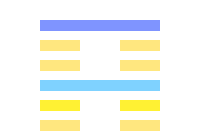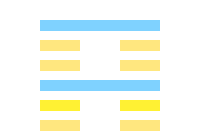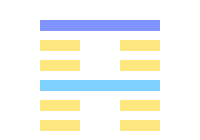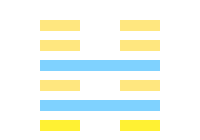52.2.6 (52 > 46)

52.2.6 (52 > 46) - THE KĂN HEXAGRAM.
- 2. The second line, divided, shows its subject keeping the calves of his legs at rest. He cannot help (the subject of the line above) whom he follows, and is dissatisfied in his mind.
- 6. The sixth line, undivided, shows its subject devotedly maintaining his restfulness. There will be good fortune.
52.2.6 (52 > 46) - Stop
One tempers one's ardour by doing spiritual exercises.
Bing DeepL Google Yandex52.2.6 (52 > 46) - Stop
One tempers one's ardor by doing spiritual exercises.
Bing DeepL Google Yandex52.2.6 (52 > 46) - Kán, l’arrêt
Kán : ferme, tenir droit, bien réglé, arrêter, reposer
-
2. « Arrêter le mouvement des jambes ». (Ou les tenir droites et bien posées.) Si, devant s’arrêter, on ne peut aider celui qui marche devant soi, on doit en avoir du déplaisir.
On doit aider et se rendre au cri d’appel. -
6. Être tout appliqué à rester ferme dans le bien est une disposition très heureuse.
On peut ainsi être juste et droit jusqu’à la fin.
52.2.6 (52 > 46) - Cesser
On tempère ses ardeurs en faisant des exercices spirituels.
Bing DeepL Google Yandex52.2.6 (52 > 46) - Megállás
- 2. Ha a másik többet akar, nem tarthatja vissza.
- 6. Tanulmányozza környezete igényeit mielőtt foglalkozna azokkal.
The trigrams
The trigrams are combinations of three yin and yang lines. The three bottom lines of the hexagram form the lower trigram and represent the inner situation. The three top lines form the upper trigram and represent the outer situation.
Upper trigram: The mountain The earth


Lower trigram: The mountain The wind


The formation: 52
What is already there

52 - THE KĂN HEXAGRAM.
When one's resting is like that of the back, and he loses all consciousness of self; when he walks in his courtyard, and does not see any (of the persons) in it, there will be no error.
Bing DeepL Google Yandex52 - Stop
One recognizes that it is time to stop because one needs to feed oneself.
Bing DeepL Google Yandex52 - Stop
One recognizes that it is time to stop because one needs to feed oneself.
Bing DeepL Google Yandex52 - Kán, l’arrêt
Kán : ferme, tenir droit, bien réglé, arrêter, reposer
Kan « ferme ». L’homme ferme tourne le dos et s’oppose résolument, sans tenir compte de lui-même. S’il traverse un endroit, il ne regarde pas qui y est et ne faillit point.
Texte
L’homme ferme s’oppose résolument (au mal) sans tenir compte de lui-même. Devant traverser un endroit, il ne regarde pas qui s’y trouve (mais le fait résolument) et ne faillit point.
Symbolisme
Deux montagnes superposées forment le Koua. Ainsi l’homme supérieur pense à ne pas dépasser les bornes de ses fonctions.
Commentaire
Kán signifie s’arrêter, tenir ferme, en bon ordre, agir ou s’arrêter selon l’occasion. Quand l’acte et sa cessation ont lieu en temps convenable, la conduite est belle et intelligente. « Rester à sa place », cela veut dire que les grands et les petits sont en rapport, mais sans usurpation ni entre-croisement. Celui qui est ferme et attentif à son devoir ne se recherche pas lui-même. Marchant dans son jardin, il ne voit pas même qui s’y trouve.
Note. Tout ceci illustre le sens « tenir droit, bien réglé » et se réfère aux rites du maintien extérieur qui prescrivent de se tenir toujours droit et de ne pas même s’asseoir sur un siège qui n’est pas droit.
52 - Cesser
On reconnaît qu'il est temps de s'arrêter car on a besoin de s'alimenter.
Bing DeepL Google Yandex52 - Megállás
Felismeri hogy itt az ideje megállni mert a többieket táplálni kell.
Bing DeepL Google Yandex
52.2 (52 > 18) - THE KĂN HEXAGRAM.
The second line, divided, shows its subject keeping the calves of his legs at rest. He cannot help (the subject of the line above) whom he follows, and is dissatisfied in his mind.
Bing DeepL Google Yandex52.2 (52 > 18) - Being attracted irresistibly
The other wants more, one cannot hold them back.
Bing DeepL Google Yandex52.2 (52 > 18) - Being attracted irresistibly
The other wants more, one cannot hold them back.
Bing DeepL Google Yandex52.2 (52 > 18) - Kán, l’arrêt
Kán : ferme, tenir droit, bien réglé, arrêter, reposer
« Arrêter le mouvement des jambes ». (Ou les tenir droites et bien posées.) Si, devant s’arrêter, on ne peut aider celui qui marche devant soi, on doit en avoir du déplaisir.
On doit aider et se rendre au cri d’appel.
52.2 (52 > 18) - Être attiré irrésistiblement
L'autre en veut plus, on ne peut pas le retenir.
Bing DeepL Google Yandex
52.6 (52 > 15) - THE KĂN HEXAGRAM.
The sixth line, undivided, shows its subject devotedly maintaining his restfulness. There will be good fortune.
Bing DeepL Google Yandex52.6 (52 > 15) - Managing anger
One listens to others before getting carried away.
Bing DeepL Google Yandex52.6 (52 > 15) - Managing anger
One listens to others before getting carried away.
Bing DeepL Google Yandex52.6 (52 > 15) - Kán, l’arrêt
Kán : ferme, tenir droit, bien réglé, arrêter, reposer
Être tout appliqué à rester ferme dans le bien est une disposition très heureuse.
On peut ainsi être juste et droit jusqu’à la fin.
52.6 (52 > 15) - Contenir sa colère
On écoute les autres avant de s'emporter.
Bing DeepL Google Yandex52.6 (52 > 15) - Megállás
Tanulmányozza környezete igényeit mielőtt foglalkozna azokkal.
Bing DeepL Google YandexIn the making: 46
What is poised to happen

46 - THE SHĂNG HEXAGRAM.
Shăng indicates that (under its conditions) there will be great progress and success. Seeking by (the qualities implied in it) to meet with the great man, its subject need have no anxiety. Advance to the south will be fortunate.
Bing DeepL Google Yandex46 - Shâng, l’ascension
Shāng : monter, s’élever, prospérer, grandir.
Shang « monter, s’élever ». Les commencements se développant, le grand homme apparaît. S’il va en avant sans souci, sans fausse inquiétude, il aura le bonheur. Comm. : le grand condescendant, vertueux, amasse les biens ; le petit s’élevant, devient grand.
Texte
[left]Quand les commencements heureux grandissent, apparaît l’homme vraiment grand.
[/left]
Symbolisme
Un arbre croissant au milieu de la terre figure Shàng, « monter ». Ainsi l’homme supérieur, s’attachant à la vertu, accumule les petits mérites, pour la rendre grande et élevée.
Commentaire
Le petit en son temps peut s’élever. Le fort condescendant et doux garde le milieu et agit convenablement (envers le petit). De là naît grande prospérité. Ainsi l’homme vraiment grand se manifeste. Il est loué de tous, ses desseins réussissent.
The nuclear hexagram: 40.1 (40 > 54)
The nuclear hexagram is the association of the two inner trigrams (lines 2,3,4 and 3,4,5). It represents the root, or the origin of the situation.

40.1 (40 > 54) - THE KIEH HEXAGRAM.
The first line, divided, shows that its subject will commit no error.
Bing DeepL Google Yandex40.1 (40 > 54) - Wanting to lose one's constraints
One wants to free oneself, it is a good decision.
Bing DeepL Google Yandex40.1 (40 > 54) - Wanting to lose one's constraints
One wants to free oneself, it is a good decision.
Bing DeepL Google Yandex40.1 (40 > 54) - Kieh, la libération
Kieh : 1. Délivrer, faire échapper, échapper au danger ; 2. Disperser ; 3. Ouvrir, séparer, s’ouvrir. Se dit du mouvement de la germination. 4. Résoudre une difficulté, une complication.
Délivrer quelqu’un est chose excellente.
Quand le fort et le faible s’entendent selon la justice, il n’y a pas de faute à craindre.
40.1 (40 > 54) - Vouloir perdre ses contraintes
On veut se libérer, c'est une bonne décision.
Bing DeepL Google YandexRuler
The starting situation

52.6 (52 > 15) - THE KĂN HEXAGRAM.
The sixth line, undivided, shows its subject devotedly maintaining his restfulness. There will be good fortune.
Bing DeepL Google Yandex52.6 (52 > 15) - Managing anger
One listens to others before getting carried away.
Bing DeepL Google Yandex52.6 (52 > 15) - Managing anger
One listens to others before getting carried away.
Bing DeepL Google Yandex52.6 (52 > 15) - Kán, l’arrêt
Kán : ferme, tenir droit, bien réglé, arrêter, reposer
Être tout appliqué à rester ferme dans le bien est une disposition très heureuse.
On peut ainsi être juste et droit jusqu’à la fin.
52.6 (52 > 15) - Contenir sa colère
On écoute les autres avant de s'emporter.
Bing DeepL Google Yandex52.6 (52 > 15) - Megállás
Tanulmányozza környezete igényeit mielőtt foglalkozna azokkal.
Bing DeepL Google YandexCorrection
The direction where the ruler is going to bend

52.2 (52 > 18) - THE KĂN HEXAGRAM.
The second line, divided, shows its subject keeping the calves of his legs at rest. He cannot help (the subject of the line above) whom he follows, and is dissatisfied in his mind.
Bing DeepL Google Yandex52.2 (52 > 18) - Being attracted irresistibly
The other wants more, one cannot hold them back.
Bing DeepL Google Yandex52.2 (52 > 18) - Being attracted irresistibly
The other wants more, one cannot hold them back.
Bing DeepL Google Yandex52.2 (52 > 18) - Kán, l’arrêt
Kán : ferme, tenir droit, bien réglé, arrêter, reposer
« Arrêter le mouvement des jambes ». (Ou les tenir droites et bien posées.) Si, devant s’arrêter, on ne peut aider celui qui marche devant soi, on doit en avoir du déplaisir.
On doit aider et se rendre au cri d’appel.
52.2 (52 > 18) - Être attiré irrésistiblement
L'autre en veut plus, on ne peut pas le retenir.
Bing DeepL Google Yandex
